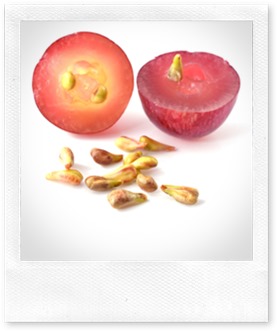The most common perimenopause and menopause symptoms are vasomotor symptoms, aka hot flashes and/or night sweats. In addition to numerous perimenopause/menopause symptoms, postmenopausal women in particular, are at increased risk for cardiovascular disease, dyslipidemia, hypertension and type 2 diabetes. Plant compounds such as French maritime pine bark extract (Pycnogenol) are rich in proanthocyanidins and have been studied in 3 studies to alleviate menopause symptoms such as vasomotor symptoms. Because of  these 3 studies, and an analysis showing that grape seeds are even richer in proanthocyanidins, researchers have conducted and published a study examining the effects of grape seed proanthocyanidin extract on menopause symptoms, body composition and cardiovascular markers.
these 3 studies, and an analysis showing that grape seeds are even richer in proanthocyanidins, researchers have conducted and published a study examining the effects of grape seed proanthocyanidin extract on menopause symptoms, body composition and cardiovascular markers.
A randomized, double-blind, placebo-controlled study was conducted in almost 100 premenopause, perimenopause and postmenopause middle-aged women between 40 and 60 y.o. The average age was 49-59 years with 40% to 48% premenopausal women, 52% to 60% perimenopausal, postmenopausal or were surgically menopausal. Women were randomized to receive grape seed extract tablets that contained either 100 mg per day or 200 mg/day of proanthocyanidins or placebo for a total of 8 weeks. Menopause symptoms were evaluated using the Menopausal Health-Related Quality of Life Questionnaire, the Hospital Anxiety and Depression Scale and the Athens Insomnia Scale before the start of treatment as well as after 4 weeks and 8 weeks of treatment.
Significant changes were observed in hot flashes, anxiety, insomnia, increased muscle mass and reduced blood pressure. The average physical symptom score for the nine items in the physical health domain of the Menopause Health Related Questionnaire significantly improved in the high dose grape seed extract group after 8 weeks, as did the mean score for hot flashes. The mean depression score did not improve in any of the groups but the anxiety subscale score improved in both the 100 mg and 200 mg group and was significantly better in the higher dose group than in the placebo. Mean body weight and fat mass did not change in any of the groups, but the mean lean mass and muscle mass increased significantly in both the 100 mg and 200 mg grape seed extract groups. Lastly, the mean systolic and diastolic blood pressure was significantly reduced in both the 100 mg and 200 mg groups and after as short as 4 weeks. The mean systolic and diastolic blood pressure decreased by about 5 mm Hg with both doses after 8 weeks.
Commentary: The menopause studies using pine bark demonstrated positive results in improving menopause symptoms at all three different doses studied in each of the studies, 60 mg, 100 mg and 200 mg. Similarly in the current study, the two doses of grape seed extract, 100 mg and 200 mg, both worked well for hot flashes, although the 200 mg dose was clearly better than the 100 mg dose in the anxiety subscale. This study appears to be the first report of proanthocyanidins affecting body composition, increasing muscle mass with both doses. The positive effect on blood pressure using proanthocyanidins, including those in grape seed extract is not a new finding. I have been using pine bark extract for vasomotor symptoms in perimenopause and menopause women for the past several years, with mixed results. I am intrigued by the current study and look forward to using grape seed extract in these two doses, as another non hormonal option, especially in women who need not only vasomotor symptom relief, but are struggling with overweight and pre-hypertension or stage I hypertension.
Reference
Terauchi M, Horiguchi N, Kajiyama A, et al. Effects of grape seed proanthocyanidin extract on menopausal symptoms, body composition, and cardiovascular parameters in middle-aged women: a randomized, double-blind, placebo-controlled pilot study. Menopause 2014;21(9):990-996.

